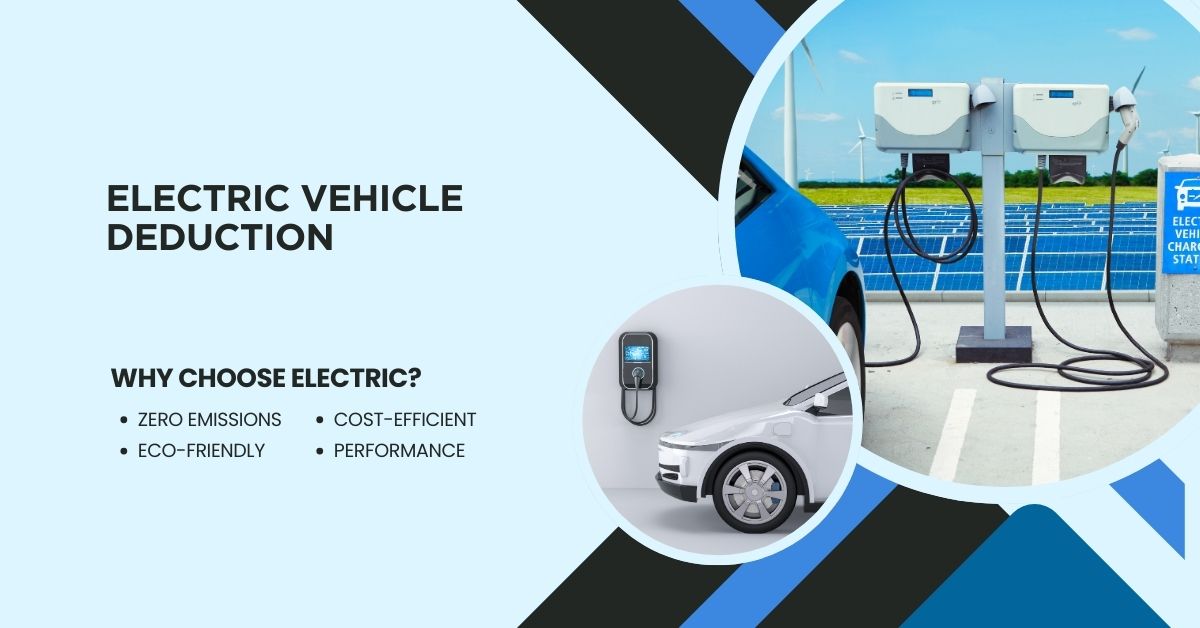Electric Vehicle Deduction
Electric Vehicle Deduction refers to tax incentives and financial benefits offered to individuals or businesses that purchase or invest in electric vehicles (EVs). These deductions aim to promote the adoption of eco-friendly transportation by reducing the upfront costs associated with EV ownership.
In many regions, governments provide credits, rebates, or deductions on income taxes for qualifying electric vehicle purchases. The amount of deduction typically depends on factors like the vehicle’s battery capacity, its price, and the region’s specific tax policies. By encouraging EV adoption, these deductions contribute to lowering greenhouse gas emissions and fostering a cleaner, sustainable future.
Table of Contents
Electric Vehicle Deduction: Maximizing Tax Benefits for EV Owners
The push toward sustainability and green energy has led to significant electric vehicle (EV) market growth. Governments worldwide offer financial incentives to encourage consumers to switch from internal combustion engines to electric-powered vehicles. One of the most attractive financial incentives for EV owners is the electric vehicle deduction, which allows buyers to save on taxes. In this comprehensive guide, we will explore everything you need to know about electric vehicle deductions, including the available tax credits, eligibility criteria, benefits, and tips for maximizing these deductions.
Understanding Electric Vehicle Tax Credits
Electric vehicle tax credits are designed to promote the adoption of EVs by reducing the overall cost to the consumer. In the United States, the federal government offers a tax credit for the purchase of qualifying electric vehicles. Here’s a detailed look at the EV tax credits:

A. Federal Tax Credit
The federal tax credit for electric vehicles was established under the Energy Improvement and Extension Act of 2008 and has undergone several updates since. The Internal Revenue Service (IRS) administers the tax credit, which can be worth up to $7,500. The amount of the credit varies depending on the battery capacity of the vehicle and whether the manufacturer has met certain sales thresholds.
B. How the Federal Tax Credit Works
The federal tax credit is non-refundable, meaning it reduces the amount of taxes owed by the taxpayer but does not result in a refund if the credit exceeds the amount of tax owed. For example, if you qualify for a $7,500 credit but only owe $4,000 in taxes, you will only benefit from a $4,000 reduction in your tax bill, with no additional refund for the remaining $3,500.
C. Phase-Out of the Federal Tax Credit
One important aspect of the federal tax credit is that it phases out for individual manufacturers once they reach 200,000 electric vehicle sales in the United States. After reaching this sales milestone, the tax credit for that manufacturer’s vehicles is gradually reduced and eventually eliminated. For example, Tesla and General Motors have both reached this threshold, meaning their vehicles no longer qualify for the federal tax credit.
D. Qualifying Vehicles
To qualify for the federal tax credit, a vehicle must meet the following criteria:
- The vehicle must be purchased new, not leased (in most cases, lessees do not benefit directly, but leasing companies may pass savings to consumers).
- The vehicle must have a battery with a capacity of at least 4 kWh and be capable of being recharged from an external source.
- The vehicle must be used primarily in the United States.
- The manufacturer must not have exceeded the 200,000 sales cap for the tax credit.
E. State and Local Incentives
In addition to the federal tax credit, many states offer additional incentives for electric vehicle owners. These incentives can take the form of rebates, tax credits, reduced registration fees, access to carpool lanes, and more. For example, California offers the Clean Vehicle Rebate Project (CVRP), which provides rebates of up to $7,000 for eligible vehicles. Other states like Colorado, New York, and New Jersey have similar programs.
Local incentives can also vary, so prospective EV owners need to research what benefits are available in their specific area.
Eligibility Criteria for Electric Vehicle Tax Credits
To claim the electric vehicle deduction, several eligibility requirements must be met. These requirements ensure that the credit is only available to those who are actively contributing to the transition to cleaner, greener modes of transportation.
A. Purchase Date
The EV must be purchased in the tax year for which the credit is being claimed. Purchases made in previous years are not eligible for the current tax year’s credit.
B. Vehicle Use
The vehicle must be intended for use on public roads. It cannot be purchased solely for resale, and it must be primarily used in the United States.
C. Personal vs. Business Use
Both individuals and businesses can claim the credit, but the rules vary slightly. If the vehicle is used for business purposes, the taxpayer may need to provide additional documentation to demonstrate eligibility.
D. Income Limitations
While the federal credit does not currently impose income limitations on eligibility, some state incentives do have income caps. For instance, California’s Clean Vehicle Rebate Project has income restrictions that limit eligibility for high-income earners.
Steps to Claiming the Electric Vehicle Tax Credit
Claiming the electric vehicle tax credit can be a straightforward process if you follow the right steps. Here’s how to go about it:

A. Determine Eligibility
First, ensure that your vehicle qualifies for the credit by checking the IRS’s list of eligible vehicles and verifying that the manufacturer has not reached the 200,000 sales threshold.
B. Complete IRS Form 8936
To claim the credit, you need to complete IRS Form 8936, “Qualified Plug-in Electric Drive Motor Vehicle Credit.” This form requires information about the vehicle, including the make, model, and date of purchase, as well as the credit amount.
C. Include the Credit on Your Tax Return
The completed Form 8936 is then included with your annual tax return. You will also need to fill in the relevant sections of your Form 1040 to apply the credit against your tax liability.
D. State Tax Credits and Rebates
If your state offers additional credits or rebates, you may need to complete separate forms to claim these benefits. Check with your state’s department of Revenue or environmental agency for specific instructions.
Financial Benefits of Electric Vehicle Deductions
The electric vehicle tax credit can offer substantial financial benefits to EV owners, making the upfront cost of purchasing an electric vehicle more manageable.
A. Lower Total Cost of Ownership
Electric vehicles generally have a higher the upfront cost compared to traditional internal combustion engine vehicles. However, the federal tax credit, combined with state and local incentives, can significantly reduce this cost, making EVs more accessible to a wider range of consumers.
B. Reduced Fuel and Maintenance Costs
Beyond the initial savings from tax credits, EV owners benefit from reduced fuel and maintenance costs over the lifetime of the vehicle. Electricity is generally cheaper than gasoline, and EVs have fewer moving parts, resulting in lower maintenance expenses.
C. Long-Term Investment in Sustainability
Purchasing an electric vehicle is also an investment in a more sustainable future. As governments and businesses continue to push for greener technologies, EV owners are contributing to a reduction in the greenhouse gas emissions and reliance on fossil fuels.
Maximizing Your Electric Vehicle Deduction
To get the most out of your electric vehicle deduction, consider these tips:
A. Timing Your Purchase
Because the federal tax credit phases out once a manufacturer sells 200,000 qualifying vehicles, timing your purchase can be critical. If a manufacturer is nearing the threshold, buying sooner rather than later can help you secure the full credit.
B. Combine Federal and State Incentives
Take advantage of both federal and state incentives to maximize your savings. In some cases, state rebates can be combined with federal credit to reduce the overall purchase price by thousands of dollars.
C. Explore Additional Benefits
Look for additional benefits such as lower registration fees, access to HOV lanes, and utility company rebates for installing home chargers. Many of these perks are designed to make electric vehicle ownership even more attractive.
D. Consult a Tax Professional
Navigating the nuances of tax credits can be complex, especially if you have multiple deductions or other financial considerations. Consulting with a tax professional can help ensure you are maximizing your benefits and filing correctly.
Future of Electric Vehicle Deductions
The landscape of electric vehicle incentives is constantly evolving as governments adapt to changing market conditions and environmental goals. Here are some potential future developments:
A. Changes to Federal Incentives
There have been discussions in Congress about extending or modifying the federal EV tax credit to include more manufacturers and possibly introduce income limits to ensure that benefits are targeted toward middle- and lower-income buyers. Keeping an eye on legislative changes can help you take advantage of new opportunities.
B. Expansion of State Programs
As states continue to focus on reducing carbon emissions, many are expected to expand their EV incentive programs. This could include increased rebate amounts, additional funding for lower-income households, and more aggressive targets for EV adoption.
C. New Technologies and Models
As automakers continue to innovate, the variety of electric vehicles on the market will expand. This means more options for consumers, ranging from affordable compact cars to high-performance luxury models, all of which could qualify for deductions.
Common Misconceptions About Electric Vehicle Deductions
There are several misconceptions surrounding electric vehicle tax credits and deductions that can lead to confusion among prospective buyers:

A. “I’ll Get a Refund if I Don’t Owe Enough Taxes.”
This is a common misunderstanding. The federal EV tax credit is non-refundable, meaning it can only reduce your tax liability to zero—it will not generate a refund beyond that.
B. “Leasing an EV Qualifies Me for the Credit.”
While leased EVs do not qualify directly for the federal tax credit for the lessee, the leasing company (which technically owns the vehicle) can claim the credit. Some leasing companies pass these savings on to the consumer in the form of reduced lease payments, but this is not guaranteed.
C. “All Electric Vehicles Qualify for the Full $7,500 Credit.”
Not all EVs qualify for the maximum credit. The amount depends on the vehicle’s battery size and the manufacturer’s sales. Some plug-in hybrid electric vehicles (PHEVs) may qualify for a reduced credit.
D. “I Can Claim the Credit Multiple Times for the Same Vehicle.”
The tax credit can only be claimed once per qualifying vehicle. If you sell the vehicle, the new owner cannot claim the credit again.
FAQs About Electric Vehicle Deduction
Q1. What is an Electric Vehicle Deduction?
The Electric Vehicle Deduction refers to tax incentives or deductions offered by governments to encourage the purchase of electric vehicles, which help reduce emissions and promote green transportation.
Q2. How do I qualify for an Electric Vehicle Deduction?
To qualify, the EV must usually be purchased new and meet specific criteria set by the government, such as battery size, vehicle type, and being used for personal or business purposes.
Q3. Are there deductions for both personal and business use of electric vehicles?
Yes, many countries provide different tax incentives for both personal and business purchases of EVs. Business users may also be eligible for additional benefits like depreciation deductions.
Q4. Can I claim an Electric Vehicle Deduction for a leased EV?
Yes, in some regions, if you lease an electric vehicle, you can still qualify for tax deductions or credits, depending on local tax laws and the lease agreement.
Q5. What is the maximum deduction or credit I can claim for buying an electric vehicle?
The amount varies by country and specific program. For example, in the U.S., the federal EV tax credit can go up to $7,500, depending on the model and battery capacity.
Q6. Can I claim the deduction multiple times for multiple EVs?
In most cases, you can claim the deduction for each qualifying EV you purchase, but some programs may have limits on the number of claims or credits.
Q7. Are used electric vehicles eligible for deductions?
Generally, deductions or credits are for new EV purchases only, but some regions may offer incentives for used EVs under specific conditions.
Q8. Do electric motorcycles or scooters qualify for the deduction?
Some regions extend deductions or credits to electric motorcycles or scooters, provided they meet the criteria, including battery capacity and usage.
Q9. Are there state or local incentives in addition to federal deductions?
Yes, many states, provinces, or local governments offer additional deductions, rebates, or credits that can be combined with federal incentives.
Q10. Does the deduction apply to hybrid vehicles?
Some hybrid vehicles, particularly plug-in hybrids (PHEVs), may qualify for a reduced deduction or credit, depending on their battery capacity and electric range.
Q11. What exactly is the Electric Vehicle Deduction?
The Electric Vehicle Deduction is a tax benefit designed to encourage the adoption of EVs by offering reductions in taxable income or providing tax credits for eligible buyers.
Q12. Which types of electric vehicles qualify for the deduction?
The deduction typically applies to fully electric vehicles (EVs) and sometimes plug-in hybrid electric vehicles (PHEVs), but the eligibility can vary based on battery size, emissions, and the specific tax policy.
Q13. How much can I save through an Electric Vehicle Deduction?
The amount you can save varies by country or region, but it can range from a few hundred to several thousand dollars in tax savings or credits, depending on the vehicle model and local incentives.
Q14. What is the electric vehicle tax credit?
The electric vehicle tax credit is a federal incentive that provides a financial rebate for purchasing an electric vehicle (EV). The credit aims to encourage the adoption of EVs and reduce carbon emissions.
Q15. How much can I deduct for buying an electric vehicle?
The tax credit for electric vehicles can range from $2,500 to $7,500 depending on the vehicle’s battery capacity and the manufacturer’s sales.
Q16. Which electric vehicles qualify for a tax credit?
Many plug-in hybrid and fully electric vehicles qualify for the tax credit. However, some manufacturers may have phased out their credits after reaching the sales threshold. You can check the IRS website for a list of eligible vehicles.
Electric vehicle deductions offer a compelling financial incentive for those considering making the switch to an electric vehicle. With federal, state, and local incentives available, EV buyers can significantly reduce the cost of their new car, making it an attractive investment in personal transportation and the environment.
As the EV market continues to evolve, staying informed about available deductions and understanding how to maximize these benefits will be key to making the most of your electric vehicle purchase. Whether you are a first-time EV buyer or looking to upgrade to a newer model, leveraging the electric vehicle deduction can lead to substantial savings and help you contribute to a greener future.
